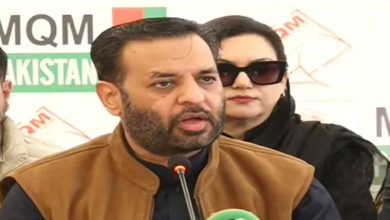PM Kakar calls upon rich nations to deliver on climate pledges

UNITED NATIONS: Caretaker Prime Minister Anwaar-ul-Haq Kakar has called on rich countries to fulfil their financial pledges to fight climate change, and extend technical support to Pakistan and other developing countries to help them achieve climate ambitions.
The premier’s comments came during separate events on the sidelines of the 78th session of the United Nations General Assembly (UNGA) in New York.
“Pakistan’s developed country partners must fulfil their pledge to provide $100 billion annually in climate finance”, Kakar said while addressing the Sustainable Development Goals (SDG) Summit Leader’s Dialogue titled “Mobilising finance and investments and the means of implementation for SDG achievement”.
He said that the country will seek climate justice at the forthcoming CoP28 Summit.
The prime minister welcomed the inclusion of many proposals advanced by Pakistan and other developing countries in the SDG Summit Political Declaration.
Separately, while addressing the Climate Ambition Summit 2023 on the sidelines of the 78th session of the United Nations General Assembly (UNGA), the prime minister urged all nations to raise their climate ambitions, regardless of their statuses and geographical locations.
He told the international community that the adverse impact of climate change continued to rise in frequency and intensity, disproportionately affecting developing countries.
“Pakistan is a prime example. Despite contributing less than 1% to global warming, we are among the top ten vulnerable countries. The unprecedented floods of last year illustrated this vulnerability but these may just be the tip of the iceberg unless we arrest this global warming,” he remarked.
PM Kakar thanked the United Nations Secretary-General Antonio Guterres for active solidarity and mobilisation of global support after the floods. He said due to its “well-established” climate vulnerability, the adaptation was a “critical” priority for Pakistan.
He said Pakistan adopted the first-ever National Adaptation Plan to build climate resilience that would follow the projection and casting of interventions identified in the said project.
He said the second phase of the plan would mark preparing for the sector-specific investment framework to serve as a blueprint to translate and identify the adaptation needs into tangible and bankable projects.
The premier also highlighted Pakistan’s “Living Indus Initiative” aimed at restoring the ecological health of the Indus basin. He said Pakistan took significant steps to enhance the early warning capacity as well as the flood protection plan.
Kakar said that despite its no contribution to global warming, Pakistan chose to be part of the solution by deciding to convert 60% of its energy resources to alternative energy by 2030 which would cost around $100 billion to the country.
Citing Quranic verses, the prime minister told the world leaders that Islam promoted responsibility to protect the environment and utilise natural resources efficiently and undertake an equitable approach to nature.
Urging the global community to come up with climate actions and support the developing countries, the prime minister said, “This will be a litmus test of solidarity and perhaps for the survival of our species on our injured planet.”
PM urges world to ensure preparedness for pandemics
While addressing the high-level meeting on Pandemic Prevention, Preparedness and Response at the UN Headquarters, PM Kakar also stressed the need to ensure better preparedness.
He said Pakistan believes that the issue of pandemic preparedness, prevention and response can be best addressed through a legally binding treaty as mandated by the World Health Assembly, for building resilience against future pandemics.
PM further said any scientific discovery, which is essential to save lives, should be treated as a global public good and be available to all countries and companies.
Secondly, commercial companies or private owners and actors should not be put in-charge of determining vaccines or medial production and distribution, he added.
Kakar said this should be determined in intergovernmental negotiations under the auspices of the World Health Organization.
The premier also emphasised global commitment to remove trade barriers, strengthen supply chains, facilitate the movement of medical and public health goods, diversify manufacturing, capacity across regions and promote technology transfer for developing countries.
He said financing effective national, regional and global health emergency preparedness will require approximately $30 billion per year, including an estimated gap of $10 billion in new external financing per year.





